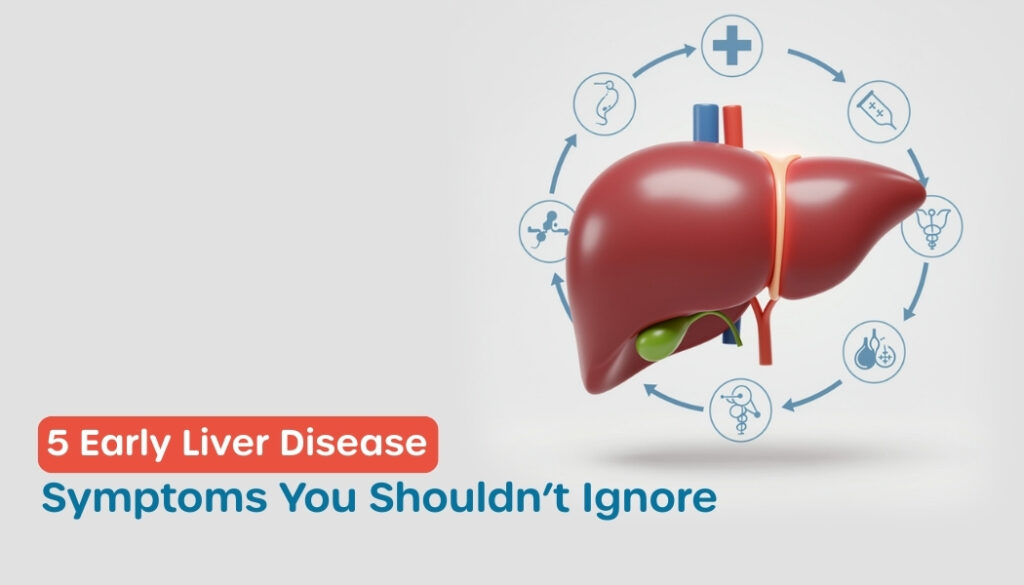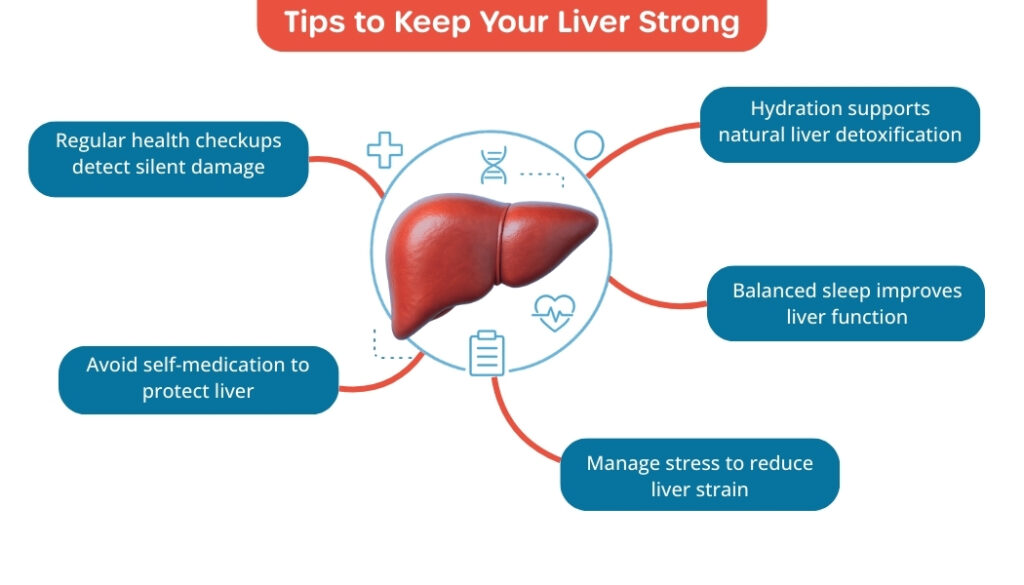
Your liver is one of the most hardworking organs in your body, yet liver disease often progresses silently until it reaches an advanced stage. Ignoring liver disease signs like jaundice, fatigue, or abdominal swelling can result in chronic liver disease, cirrhosis, or even liver failure.
The five most common liver disease symptoms that demand attention are jaundice, chronic fatigue, abdominal swelling, dark urine/pale stool, and confusion due to hepatic encephalopathy.
At Shinon Healthcare, we guide patients to the best liver transplant hospital in India and provide comprehensive support as the best medical travel partner in India, ensuring you get timely diagnosis, treatment, and compassionate care.
Keep reading to learn how to spot the red flags early and protect your liver health.
5 Clear Signs That Your Liver Needs Care
Recognizing these Liver Disease Symptoms early can help you detect serious health issues before they progress into advanced liver damage.
Jaundice – Yellowing of Skin and Eyes
Jaundice is one of the most common liver disease symptoms. It occurs when bilirubin builds up in the blood, causing the skin and eyes to turn yellow. This may indicate hepatitis, bile duct blockage, or advanced cirrhosis.
Persistent Fatigue and Weakness
Constant tiredness and weakness are common in chronic liver disease. When the liver cannot process nutrients properly or regulate metabolism, the body feels drained of energy. Fatigue is often seen in conditions such as fibrosis, liver inflammation, and end-stage liver disease (ESLD).
Abdominal Swelling (Ascites) and Discomfort
Ascites refers to the buildup of fluid in the abdomen, usually caused by portal hypertension. It is a common complication of cirrhosis or long-term liver damage that leads to scar tissue formation.
Dark Urine and Pale Stool
Changes in urine and stool color are often linked to reduced bile production and poor bilirubin clearance. Dark urine and pale stools may indicate drug-induced liver injury (DILI), primary biliary cholangitis, or primary sclerosing cholangitis.
Confusion and Forgetfulness (Hepatic Encephalopathy)
When the liver fails to filter toxins from the blood, these toxins can reach the brain and cause hepatic encephalopathy. This leads to confusion, forgetfulness, and in severe cases, drowsiness or reduced consciousness. It is considered a serious sign of acute liver failure.
Understanding the Causes Behind These Symptoms
Liver disease causes can vary widely, ranging from lifestyle factors to genetic conditions:
- Lifestyle risks: Alcohol abuse, obesity, Type 2 diabetes, metabolic syndrome, high cholesterol, high triglycerides, and insulin resistance are leading contributors to liver disease.
- Infections: Viral hepatitis (A, B, and C) remains one of the most common causes worldwide.
- Autoimmune and genetic factors: Conditions such as Wilson’s disease, hemochromatosis, and autoimmune hepatitis can damage the liver over time.
- Medications and toxins: Certain drugs and chemicals may lead to drug-induced liver injury (DILI), which can significantly affect liver function.
By understanding these causes, you and your doctors can focus on prevention, timely diagnosis, and appropriate treatment to protect your liver health.
How Early Detection of Liver Symptoms Prevents Serious Damage?
Identifying liver disease signs early is essential for protecting long-term health. Early recognition helps in the following ways:
- Detects silent conditions early: Fatty liver (NAFLD, MASLD, MASH, ALD, MetALD), viral hepatitis (A, B, C), and autoimmune hepatitis often progress without obvious symptoms.
- Prevents disease progression: Timely diagnosis can slow or stop damage from advancing to fibrosis, cirrhosis, portal hypertension, or hepatocellular carcinoma (liver cancer).
- Avoids severe complications: Early treatment reduces the risk of ascites, esophageal varices, portal vein thrombosis, spontaneous bacterial peritonitis, and hepatorenal syndrome.
- Improves treatment outcomes: Detecting problems early allows for effective lifestyle changes, medical therapy, or, in advanced cases, planning for liver transplantation.
What to Do Next If Diagnosed with Liver Disease?
If you notice any liver disease symptoms, consulting a hepatologist or gastroenterologist is the first step. They may recommend the following tests to confirm the cause and stage of liver damage:
- Blood tests: Liver function tests such as ALT, AST, bilirubin, albumin, INR, and other inflammation markers.
- Scoring systems: MELD score, which helps assess disease severity and eligibility for liver transplantation.
- Imaging studies: Ultrasound, CT scan, MRI, or FibroScan (transient elastography) to check for fibrosis and structural changes.
- Liver biopsy: A tissue sample may be taken for definitive diagnosis when required.
Early and accurate diagnostic testing helps identify the problem, decide the right treatment plan, and improve overall prognosis.
Treatment and When Liver Transplant Becomes Essential
The treatment of liver disease depends on the stage and underlying cause. Doctors usually recommend a stepwise approach:
- Lifestyle interventions: Weight loss, balanced diet, sugar reduction, alcohol moderation, cholesterol control, and regular physical activity help in early-stage conditions like fatty liver.
- Medical management: Vaccination (Hepatitis B), antiviral therapy, nutritional counseling, and medicines to control complications such as portal hypertension or fluid retention.
- Advanced treatment: In severe cases such as cirrhosis, hepatocellular carcinoma, or end-stage liver disease (ESLD), a liver transplant may be the only effective option.
India is recognized worldwide for providing safe and affordable liver transplant surgery at the best liver transplant hospitals, supported by highly experienced specialists and comprehensive post-transplant care.
Why Choose Shinon Healthcare for Liver Treatment in India?
With over 15 years of experience in international healthcare facilitation, Shinon Healthcare stands out as a medical travel partner, especially for liver transplant care. Here’s how we support every patient:
- Expert guidance to top centers – We connect you with leading liver transplant specialists at elite, accredited hospitals in India.
- Transparent costing with high success rates – India’s liver transplant success rates range from 85-95%, with treatment costs typically 4-5 times lower than in Western countries.
- NABH-accredited Medical Value Travel provider – Shinon is one of only 25 medical value travel companies in India to have earned this accreditation for quality and safety.
- End-to-end seamless support – Our services cover everything from diagnostics and treatment coordination to travel logistics, visa assistance, hospital admissions, and post-transplant care.
- Global presence with local expertise – With operations spanning India, UAE, Iraq, Nigeria, and more, we offer culturally aware and personalized support for international and domestic patients.
- Donor-centric transplant programs – Many of our partner hospitals guarantee near-100% donor success rates, instilling confidence in both donors and recipients.
Shinon Healthcare is recognized as the best medical tourism company in India trusted for delivering a smooth, patient-centered, and cost-effective route to world-class liver care.
Conclusion
Protecting your liver is not only about treatment but also about prevention and awareness. Regular health checkups, balanced nutrition, maintaining a healthy weight, and limiting alcohol intake can go a long way in keeping your liver strong. Early lifestyle choices often make the difference between long-term health and advanced disease.
At Shinon Healthcare, we believe that informed patients make stronger recovery journeys. Our role is to guide you with clarity, connect you with trusted specialists, and ensure that every step of your care is supported with transparency and compassion. Take control of your liver health today with Shinon Healthcare’s expert support.
FAQs
Can liver disease be detected in routine blood tests?
Ans. Yes, common blood tests like liver function tests (LFTs) can detect early liver problems even before symptoms appear.
Does liver disease always require surgery or transplant?
Ans. No, many liver conditions can be managed with lifestyle changes, medications, and regular monitoring. Transplant is only needed in severe or end-stage cases.
Is fatty liver reversible?
Ans. Yes, in its early stages, fatty liver can often be reversed with weight loss, exercise, and dietary changes.
How long can you live with liver disease without treatment?
Ans. This depends on the cause and severity. While some forms progress slowly, advanced liver disease without treatment can lead to life-threatening complications.
Can liver disease be prevented?
Ans. Yes, through vaccination (Hepatitis B), avoiding alcohol misuse, maintaining a healthy weight, and regular health screenings.
